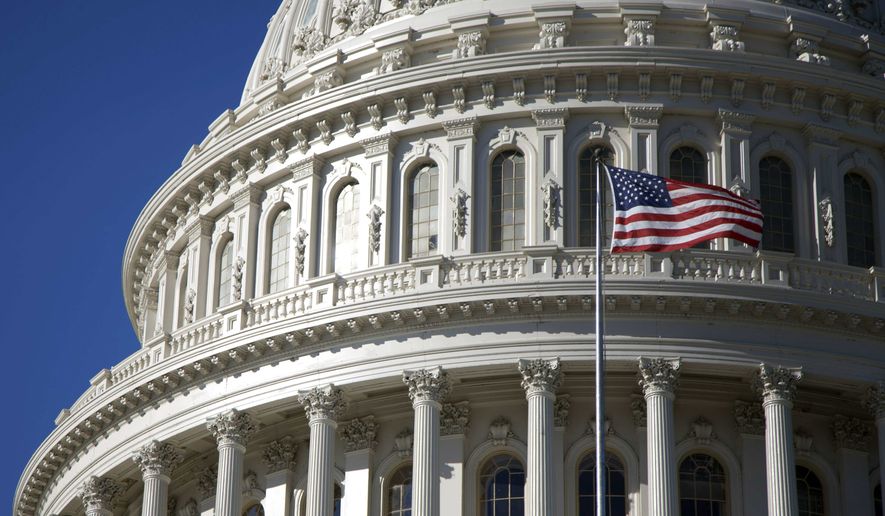Congress returns to work this week from the summer recess. Lawmakers are heading into a battle over a critical stopgap spending bill that threatens to pit Democrats against each other.
As the Senate gaveled back in session on Tuesday, lawmakers worked behind the scenes on a deal to extend government spending past a Sept. 30 deadline, when the fiscal year ends and funding runs dry.
Democrats, who have thin majorities in the House and Senate, plan to introduce a bill that temporarily funds the government until some time in December, getting them more time to finish spending bills for the rest of the 2023 fiscal year.
House lawmakers return on Sept. 13.
Democratic leaders will likely tack some extras onto the stopgap bill that could make it harder to get the measure to President Biden’s desk before Oct. 1, the deadline for avoiding a partial government shutdown.
Democrats and Republicans are balking at plans to add on legislation to speed up permits for fossil fuels and renewable energy projects.
SEE ALSO: Congress is back: McConnell, Schumer trade barbs over student debt relief, inflation
Some Republicans will oppose a costly last-minute addition: Mr. Biden’s $47 billion emergency spending request, of which $22.4 billion would be dedicated to fighting COVID-19.
“Democrats are going to work in good faith to avoid even a hint of a shutdown,” Senate Majority Leader Charles E. Schumer, New York Democrat, said Tuesday. “And it is my expectation that our Republican colleagues will do the same.”
The measure to speed up energy permits was authored by Sen. Joe Manchin III, a West Virginia Democrat whose vote last month was critical to his party unilaterally passing legislation that hikes taxes, funds green energy projects and lowers prescription drug prices.
Mr. Schumer secured Mr. Manchin’s vote by publicly pledging to “pass” legislation to overhaul energy permits by year’s end.
He said House Speaker Nancy Pelosi, California Democrat, also agreed to pass the legislation.
The Manchin measure also would help speed up the completion of the long-stalled Mountain Valley Pipeline, which carries natural gas and runs through West Virginia.
But far-left Democrats are threatening to vote against the stopgap spending bill if it includes the permit speedup, which they say will gut environmental and health protections.
“Polluting industries may have won that promise in a deal with a select few, but I intend to do everything in my power to convince the rest of my colleagues to break it,” said House National Resources Committee Chairman Raul Grijalva, Arizona Democrat.
The language also faces opposition from GOP lawmakers who were angered by the deal and whose votes are needed to advance the spending bill over the Senate’s 60-vote threshold.
Republicans universally oppose the tax and energy bill, dubbed the Inflation Reduction Act. It hikes taxes to pay for $370 billion in new green energy programs and it authorizes the government to negotiate some Medicare prescription drug prices. It will do nothing to lower inflation, according to economists.
Republicans believe Mr. Manchin double-crossed them by concealing the deal to get GOP lawmakers to vote for a bill to give $52 billion to U.S. companies to manufacture semiconductor chips. That’s why some have vowed to vote against the stopgap bill if it includes the permit deal.
“I will not vote for a resolution that is part of a political payback scheme,” said Sen. Lindsey Graham, South Carolina Republican.
The stopgap package also includes spending that will be difficult for some Republican lawmakers to oppose.
Mr. Biden’s $47 billion emergency request includes $6.5 billion to aid communities harmed by natural disasters this summer, among them Kentucky, where devastating floods in the eastern part of the state have destroyed homes, washed away infrastructure and killed dozens of people.
Senate Minority Leader Mitch McConnell, Kentucky Republican, told reporters last week he was not satisfied with the federal government’s response to the flooding. He has not indicated whether he’ll back Mr. Biden’s emergency aid request.
Another $11.7 billion would go to Ukraine aid and $2 billion would go to address “the impacts Putin’s war has had on domestic energy supply and reduce energy costs in the future.” The request also includes $3.9 billion for vaccines, treatment and operational support to combat monkeypox.
Correction: A previous version of the story incorrectly described the type of energy transported by the Mountain Valley Pipeline.
For more information, visit The Washington Times COVID-19 resource page.
• Susan Ferrechio can be reached at sferrechio@washingtontimes.com.




Please read our comment policy before commenting.